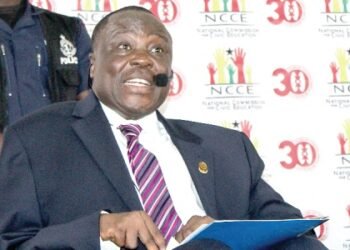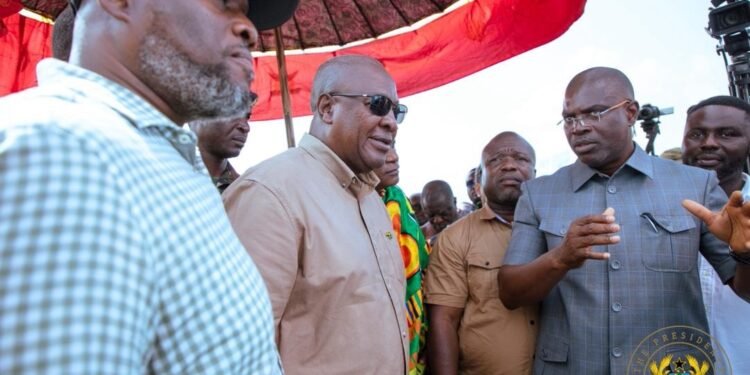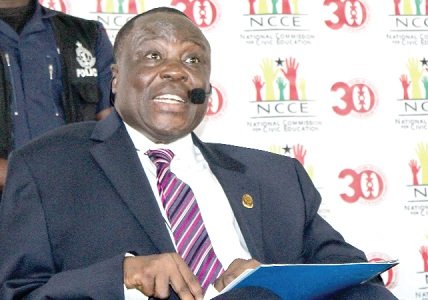Honourable Peter Lanchene Toobu, Member of Parliament for Wa West has outlined an extensive suite of policy proposals of the National Democratic Congress aimed at enhancing Ghana’s security and improving the standard of living of security professionals.
Speaking at a sectorial briefing, Hon. Toobu, the Spokesperson on Security for the National Democratic Congress (NDC)’s 2024 Manifesto outlined a detailed plan that the next NDC government, led by former President John Dramani Mahama, intends to implement to bolster security and public safety across the nation.
Enhancing Security to Support a 24-Hour Economy
A cornerstone of the NDC’s security policy is the development of a comprehensive security and safety program tailored to support the party’s proposed 24-hour economy policy.
To achieve this, Hon. Toobu indicated that the next NDC government would recruit an additional 25,000 security officers, to boost the manpower needed to ensure round-the-clock safety and security.
Hon. Toobu emphasized that this recruitment drive would be conducted transparently and based on merit.
“We will ensure that all recruitments and promotions within our security agencies are decentralized and aligned with a thorough human resource gap analysis”
Honourable Peter Lanchene Toobu, MP Wa West and Spokesperson NDC’s 2024 Manifesto on Security
Strengthening Community Policing and Crime Prevention
Recognizing the importance of community involvement in crime prevention, Hon. Toobu stated that the NDC manifesto promises to expand community-based crime prevention programs, particularly in high-crime areas.
This initiative according to him, will involve enhancing police presence and increasing patrols in neighbourhoods and public spaces to deter criminal activities, adding that a nationwide community police program will also be introduced to foster closer cooperation between the police and the communities they serve.
To further bolster security, the NDC plans to invest significantly in ICT infrastructure, modern equipment, training, and mobility for security agencies.
“Our focus will be on supporting intelligence gathering and improving national safety,” Hon. Toobu explained.
Combating Terrorism and Arms Proliferation
Speaking on how the NDC intends to address the growing threats of terrorism and illegal arms trafficking, the Spokesperson on Security for the National Democratic Congress (NDC)’s 2024 Manifesto mentioned that the NDC would enhance border security and strengthen cooperation with international partners to combat terrorism financing and foreign terrorist fighters.
According to him, the party also aims to implement strict measures to control the proliferation of small arms and light weapons, a key factor in curbing violence and maintaining public order.
Improving Conditions for Security Personnel
Highlighting the opposition party’s plans to improve conditions for security personnel, the Spokesperson on Security for the National Democratic Congress (NDC)’s 2024 Manifesto announced that the NDC would undertake comprehensive reforms to improve the welfare of security personnel.
Hon. Toobu highlighted plans to clear the backlog of promotions within security agencies, ensuring timely advancements based on merit and transparency.
Additionally, he reiterated the NDC’s pledges to harmonize salaries, remuneration, and other conditions of service across all security agencies, addressing longstanding disparities that have affected morale.
Hon. Toobu also added that the welfare of both serving and retired security personnel will be a priority under the next NDC government.
He mentioned that there are plans to review and enforce medical packages for personnel and their families, improve compensation for those who lose their lives or are injured in the line of duty, and introduce state-of-the-art technology for police operations.
Modernizing the Correctional System
In a bid to transform the correctional system, Hon. Toobu revealed that the NDC proposes to change the name of the Ghana Prison Service to the Ghana Correctional Service.
This rebranding according to him, is part of a broader effort to modernize prisons and make them more humane, highlighting the party’s plans to create well-equipped technical and vocational departments in all major prisons, providing inmates with valuable skills that can aid in their rehabilitation and reintegration into society.
Investing in the Ghana Armed Forces
For the Ghana Armed Forces, the Member of Parliament for Wa West announced that the NDC’s manifesto outlines a series of initiatives aimed at improving the living conditions and welfare of military personnel.
This he noted includes constructing new housing units and refurbishing dilapidated ones across the country, as well as establishing an Armed Forces Home Ownership Scheme.
Hon. Toobu also reiterated the opposition party’s promises to review and adjust salaries and allowances for troops and civilian staff in the Defence sector to reflect changing economic realities.
In terms of healthcare, Hon. Toobu mentioned that the NDC plans to complete and equip the Kumasi Military Hospital in the Central Command and initiate the construction of military hospitals in Ho, Bolgatanga, and Sefwi Wiawso.
To further support veterans, Hon. Toobu announced the party’s proposal to establish Veterans’ Referral Departments in Military Hospitals nationwide.
Commitment to Transparency and Accountability
Throughout his address, Honourable Peter Lanchene Toobu, MP Wa West and Spokesperson NDC’s 2024 Manifesto on Security stressed the NDC’s commitment to transparency and accountability in all aspects of security governance.
This includes ensuring a fair selection process for peace support operations and establishing the National Disaster Management Organization (NADMO) Fund as mandated by the NADMO Act, 2016 (Act 927).
Honourable Peter Lanchene Toobu’s detailed outline of the NDC’s security policies underscores the party’s commitment to creating a safer, more secure Ghana.
He emphasized that by focusing on comprehensive reforms across all sectors of the security apparatus, the NDC aims to build a robust framework that not only addresses current security challenges but also prepares the nation for future threats.






















